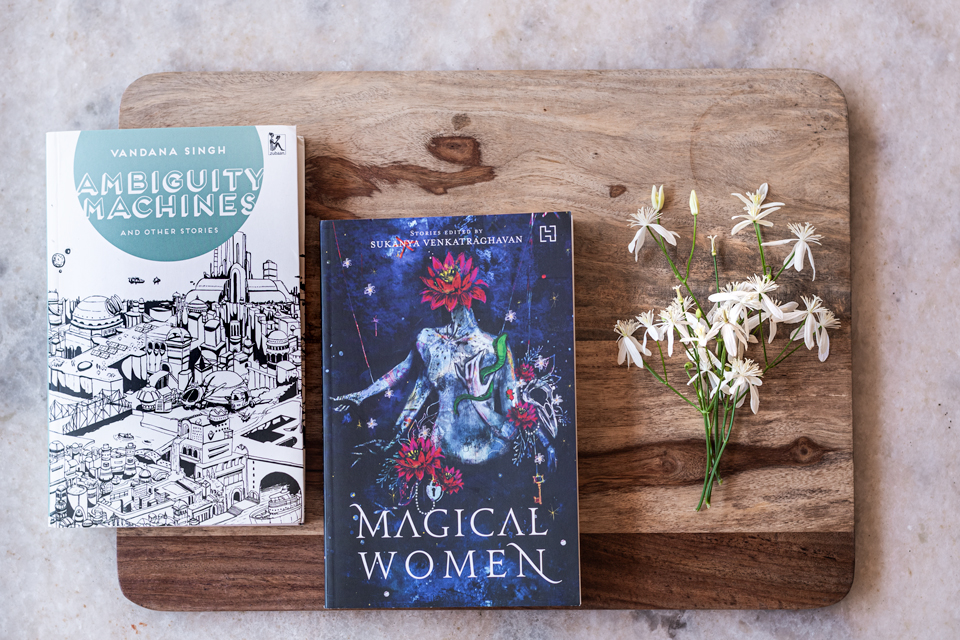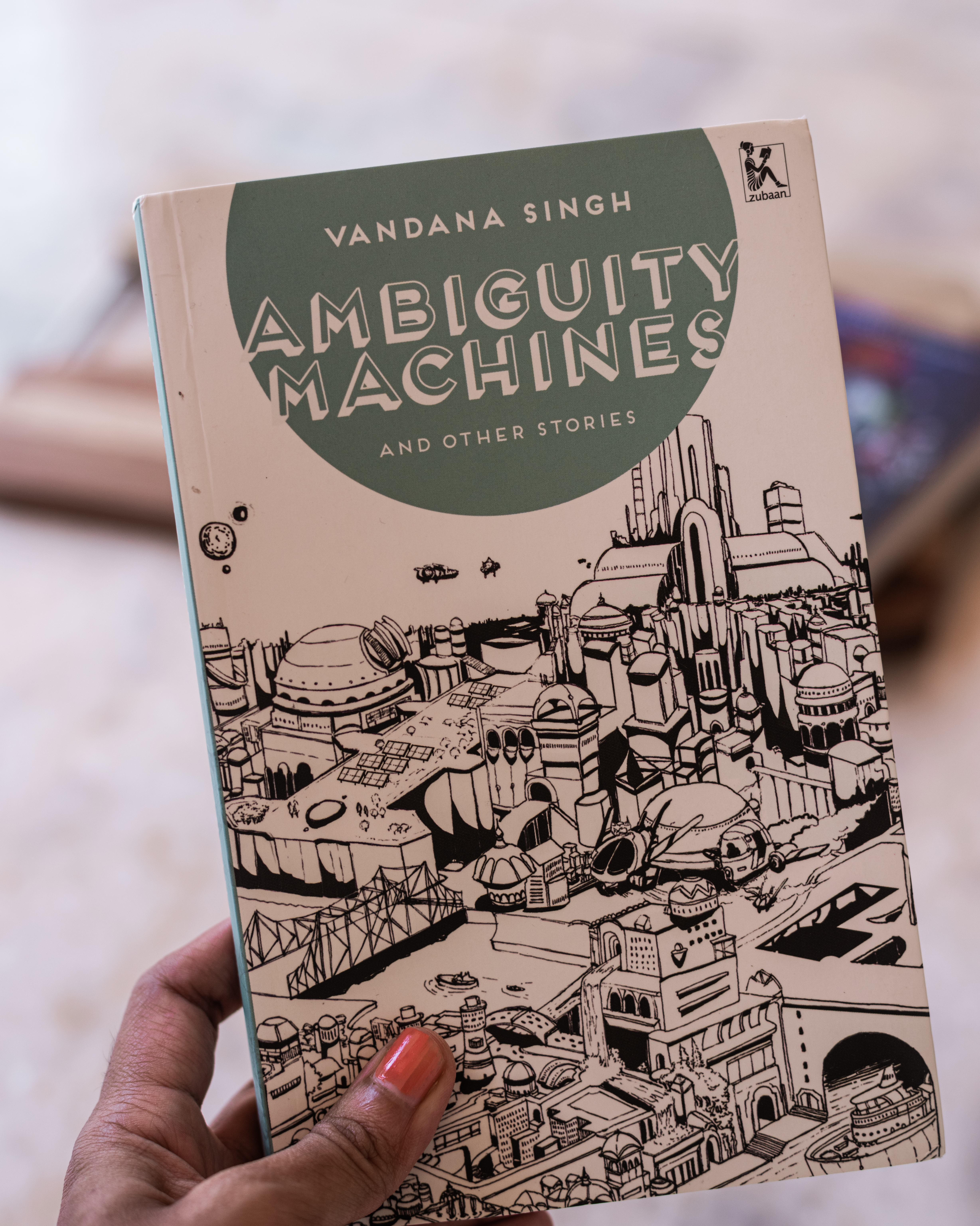Reader. Dreamer. Writer.
India’s science fiction and fantasy scene is little explored, dominated so far by retellings of popular myths (there are some amazing original novels too of course). Magical Women, a collection of 14 stories by women, about women, arrives at this kind-of barren environment like a much needed monsoon shower. Ambiguity Machines by Vandana Singh on the other hand, is quite different from the usual SFF stories. Weird, but so good. It is quintessentially Indian with Upmanyus, Rassundaris, Rimas and Varshas (and more, I guzzled up the names in this collection), and probably the book that we’ve been waiting for all this time.
MAGICAL WOMEN EDITED BY SUKANYA VENKATRAGHAVAN
Talk of vegan witches, statues that come to life, puppets, courtesans from 1800s, and tattoos. Creation has a handbook in Rulebook for Creating the Universe by Tashan Mehta and obedient weavers create whole universes. But there are rules (A girl cannot stitch the sun but can weave forests, Follow the blueprint, Don’t follow the girl who tried to steal time and created a world where they call god a woman etc). This was such an original and charming look at how new worlds are created. Goddesses make appearances in many stories, mostly bickering, often tired and with a determination to set things right. I enjoyed most of the stories in the collection. They felt cohesive as an anthology and fitted together like pieces of a puzzle even though the writers worked independently.
The first story that I read was Nikita Deshpande’s The Girl who Haunted Death. I loved it! Satyavan-Savitri (a wife winning back her dead husband from the god of Death) is one of my favourite stories and Deshpande gives form and voice to Death who often remains as a shadow in the stories. I found this utterly captivating. The Rakshasi’s Rose Garden by Sukanya Venkatraghavan was absorbing; about a rakshasi, an unmarried woman actually, who has a beautiful garden in her balcony and is subject to the gossips of the aunties in the neighbourhood. The story moved fast enough to shock, touching on sensitive themes of abuse and women standing up for the powerless ones.

S. V. Sujata’s Gandeberunda took me by complete surprise. I had previously read Sujata’s The Demon Hunter of Chottanikkara. Both are so different in tone, and presentation that had I not glanced at the name of the writer, I would not have imagined that both are written by the same person. Amaya who swears and ‘drinks like a fish’, has an evil twin (?). She has no patience towards patronizing and predatory men. It was remarkable, and showed off the talent of the writer to be flexible as required by the story she tells. Grandma Garam’s kitty party by Shweta Taneja was one of the most fun stories in the collection. It is a chudail party where a young witch announces she wants to “go to an office and marry someone nice”, in other words, convert from Chudailism to being a Straightener. I adored the parts about how witches blend into our society, including them working in Bollywood horror films and also the slapstick comedy towards men in the form of Fetish man. Too good! Beneath the fun bits, it is a story about identity. belief and self acceptance. Shweta Takrar’s The Carnival at the edge of the worlds was bizarre and enchanting with a twist to the familiar Nala-Damayanti tale. Tridevi Turbulence by Trisha Das, was more traditional in setting but modernist in dialogue, with the goddesses having a heartfelt chat about men, gods, and the state of the world. It was witty, yet had sad undertones, and of course a silent rage.
Women are in the forefront in this collection of SFF stories, which is such a joy. This is definitely a book that keeps you entertained, story after story.
Title : Magical Women
Edited by : Sukanya Venkatraghavan
Publisher : Hachette India
Publication: 2019
Language : English
Pages : 232
Rating : 4/5

Ambiguity machines by Vandana Singh
To be honest, I do not want to review Ambiguity Machines, because this fantastic collection has stories that should be read at leisure, at one’s own pace, on lazy afternoons. These stories not to be dissected and critiqued, rather sipped with utmost care.
Hence, I don’t know where to begin. I enjoyed the stories, I was amused, enthralled and even when I felt distant from a story, I was quickly ushered in with the entry of a new character or a plot twist. There are often stories inside stories, reminiscent of the famous story telling traditions of India. So I do not pick favourites here, for all the reasons above. There are gadgets, alternate worlds, and time travel fitted into completely mundane emotions of love, longing and dissatisfaction.
Oblivion: A Journey begins with “I haven’t changed my sex in eighty three years” and describes fascinating ‘world shells’, a chain of island satellites, natural and artificial where they ‘learnt, lived and enacted our lives…based on Ramayana’. It is a twist on the Ramayana with mother machines, first generation beings, a Ravan who likes absinthe and roses and flees across planets. In Somadeva : A Sky river Sutra, a poet and the author of Kathasarithsagara is brought to life, fifteen centuries after his death, by a reader who collects stories of different cultures. Here the lines blur between fiction and reality, reminding me of Helen Oyeyemi’s Mr. Fox. A Handful of rice is set in a Mughal era (but not your usual one) and follows an assassin who wants to murder the emperor while other stories take you to Kolkata (and Calcutta) and a future Alaska. The titular story, that encompasses three vignettes (a Mongolian engineer conjures up the face of his beloved in imprisonment, a mathematician finds time travel and an archaeologist discovers a community), can be found here and urges the reader to make sense of the three.

The stories included are not short (save for one or two), so they need plenty of time at your disposal. Singh’s stories are slow paced, wonderfully crafted with poetic sentences and humane. It was interesting to note that they are more literary in their build and introduces you to fantastical worlds so gently, that you accept their strangeness as if they are your own regular world. Ambiguity Machines is unapologetically South Asian, not Westernised, and startlingly original, which makes it worth your time.
Title : Ambiguity Machines
Edited by : Vandana Singh
Publisher : Zubaan
Publication: 2018
Language : English
Pages : 312
Rating : 4/5
Two crackling Indian SFF collections. We have witch parties, bickering goddesses, rule books for creating universes, tattoos, puppets, reborn poets, Mughal era assassins, and more. Check these out for some original, weird worlds. Share on X
Disclaimer : Much thanks to the publishers for the books. All opinions are my own.
You might also enjoy
Meena Arora’s compendium of popular folktales and myths from India — The Blue Lotus










THIS IS AMAZING! I had not heard of either of these collections and I am in love and hoping to find a way to get them when I next go on a book buying binge.
Awesome. I hope you will enjoy them too 🙂
Wow. You definitely got me sold for Magical Women! It sound sooo intriguing. By the way, do you know of any classic story that fears Indian mythology (with all the Gods)? I feel like Western literature is riddled with stories on Greek/Roman Gods but the ones from Hinduism would make for such cool stories!
That’s so true sadly. There are quite a few novels that are reimaginings of Indian mythology. The Palace of Illusions by Chitra Banerjee was nice, though not a favourite. One that I really liked was Liberation of Sita by Volgan(translated). It reimagines the women of the epics with a feminist take.